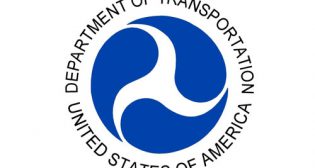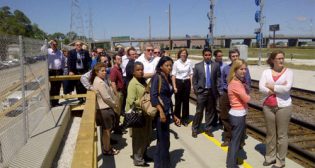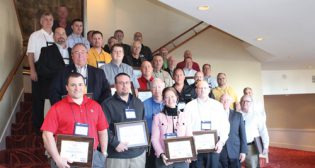The United States Federal Railroad Administration will give eight cities and states a shared $19.4 million to replace, relocate and improve segments of railroad track in order to enhance safety, livability and economic development. The FRA received 51 applications from across the country for the Rail Line Relocation and Improvement grants, seeking more than $202 million.
"The strong desire to improve infrastructure and foster economic development throughout America is evident in the overwhelming demand by our nation’s cities and states," said U.S. Transportation Secretary Ray LaHood. "These strategic investments will help advance President Obama’s vision to create jobs, build livable communities, and stimulate economic growth through local projects that deliver the greatest public benefits."
FRA’s RLR Grant Program assists projects that improve community livability and promote economic development by addressing the effects of rail traffic on safety, roadway and pedestrian traffic, overall quality of life and local area commerce. Funding for these grants is made available through annual appropriations and requires a 10 percent contribution from the project sponsor. Rail line relocation dollars announced will fund the following projects:
Port of San Francisco, California – Quint Street Yard Track and Signal Improvements – $2,970,000 to improve an approximately one mile-long spur connecting a Caltrain mainline track to the San Francisco Rail Yard. The mainline is under consideration for use as part of the California high-speed rail project and the current condition of the spur track limits the frequency, weight and length of trains that can use the track, causing delays. The improvements will allow freight trains to operate at higher speeds and clear the mainline more quickly.
Sprague, Connecticut – Providence & Worcester Railroad Willimantic Branch – $5,302,900 to upgrade track on the Providence and Worcester Railroad Company’s Willimantic Branch, allowing freight operations to increase speed from 10 mph to 40 mph. Improvements will provide for more efficient movement of freight shipments originating from or destined to customers across the nation or overseas.
Maryland Department of Transportation- Canton Area Rail Improvement Project – $1,742,240 for the expansion of a Canton Railroad Company yard facility. Current switching operations often cause major motor vehicle traffic delays, requiring traffic to be rerouted around the yard. The improvements will permit more efficient switching operations and create additional car storage, which will help reduce traffic congestion.
Tavares, Florida – Florida Central Railroad Upgrade and Rehabilitation – $2,200,000 to upgrade a segment of track on the Florida Central Railroad in Lake and Orange counties, allowing increases in speed from 10 mph to 40 mph. Coupled with additional track and bridge repairs, freight service can be restored to areas currently not served by rail. The improvements may also benefit potential future SunRail commuter service and an excursion train service between Orlando and the City of Mt. Dora.
Minnesota Department of Transportation – K-Line Rail Improvement Project – $1,469,556 to improve and extend a municipally-owned rail spur. Extending the track will enable a local shipper, whose current location forces it to route traffic close to a high school, to relocate its operations to the industrial park.
Arkansas State Highway and Transportation Department – Arkansas Midland Railroad/Warren Branch – $2,721,435 to rehabilitate and improve 40 miles of track along the Warren Branch of the Arkansas Midland Railroad, a shortline railroad located in the Arkansas Delta. The planned improvements will remedy poor track conditions caused by inadequate drainage and heavy freight loads, which have contributed to washouts, broken rails, derailments and slow orders that reduce train speeds.
Springfield, Missouri – West Wye Connection Track – $1,898,444 to relocate an existing "Wye" track that runs through the center of Springfield to the western side of the city. The project will enable the permanent removal of 23 highway-rail grade crossings, increasing roadway safety in the area while improving railroad operational performance.
Alaska Railroad – Milepost 142 Curve Alignment – $1,141,840 to reduce the curvature of the Alaska Railroad mainline adjacent to the Native Village of Eklutna. The realignment and improvements will increase track speeds, reduce noise and improve operating safety and efficiency. A new access road will also allow vehicles to access trains for inspection and car repair and provide Eklutna, Inc., tribal members access to their property.
In September, as part of the Rail Line Relocation Grant Program, FRA will issue a Notice of Funding Availability for more than $11.5 million (made available through annual appropriations), with applications due 30 days later.




